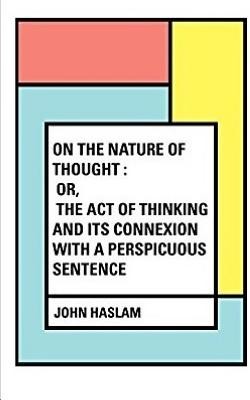
- We will send in 10–14 business days.
- Author: John Haslam
- Publisher: CreateSpace Independent Publishing Platform
- ISBN-10: 1973746123
- ISBN-13: 9781973746126
- Format: 12.7 x 20.3 x 0.3 cm, minkšti viršeliai
- Language: English
- SAVE -10% with code: EXTRA
Reviews
Description
This is a health book. Some modern psychologists would say, not only that it takes its origin from needs and is posterior to action, but that it always remains in its whole structure subservient to practical ends. Just as some ancient thinkers held that virtue was simply a kind of knowledge, so for these moderns thought is nothing more than a kind of will; will itself being assumed to be primarily directed to practice. What distinguishes thought from mere trains of associated ideas is that the passive states of consciousness that enter into it are seized upon by an active 'apperception', and, by being thus seized upon, are turned into connected 'thought-series'. The device of these psychologists might be: 'Pro ratione voluntas'. If, in opposition, we were to point to the Aristotelian ideal of the self-contained contemplative life, they might admit this to be a possible ideal and still maintain the essential part of their view. Perhaps they would not admit its possibility; but if they did, it would be open to them to insist that the contemplative life is still in a manner active. It is certainly not without volition. At most the volition may be supposed to become in the end unimpeded. And it is undoubtedly an ideal that in more than one way presupposes strictly practical activity in some kind of relation to it.
- Author: John Haslam
- Publisher: CreateSpace Independent Publishing Platform
- ISBN-10: 1973746123
- ISBN-13: 9781973746126
- Format: 12.7 x 20.3 x 0.3 cm, minkšti viršeliai
- Language: English English
This is a health book. Some modern psychologists would say, not only that it takes its origin from needs and is posterior to action, but that it always remains in its whole structure subservient to practical ends. Just as some ancient thinkers held that virtue was simply a kind of knowledge, so for these moderns thought is nothing more than a kind of will; will itself being assumed to be primarily directed to practice. What distinguishes thought from mere trains of associated ideas is that the passive states of consciousness that enter into it are seized upon by an active 'apperception', and, by being thus seized upon, are turned into connected 'thought-series'. The device of these psychologists might be: 'Pro ratione voluntas'. If, in opposition, we were to point to the Aristotelian ideal of the self-contained contemplative life, they might admit this to be a possible ideal and still maintain the essential part of their view. Perhaps they would not admit its possibility; but if they did, it would be open to them to insist that the contemplative life is still in a manner active. It is certainly not without volition. At most the volition may be supposed to become in the end unimpeded. And it is undoubtedly an ideal that in more than one way presupposes strictly practical activity in some kind of relation to it.


Reviews